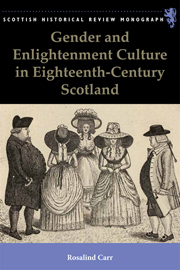Book contents
- Frontmatter
- Contents
- Acknowledgements
- List of Abbreviations
- Introduction: Gender and Scottish Enlightenment Culture
- 1 Masculinity, Homosociality and Intellectual Culture
- 2 Women and Intellectual Culture
- 3 Urbane and Urban Sociability in Enlightenment Edinburgh
- 4 Enlightened Violence? Elite Manhood and the Duel
- Conclusion
- Bibliography
- Index
1 - Masculinity, Homosociality and Intellectual Culture
Published online by Cambridge University Press: 05 September 2014
- Frontmatter
- Contents
- Acknowledgements
- List of Abbreviations
- Introduction: Gender and Scottish Enlightenment Culture
- 1 Masculinity, Homosociality and Intellectual Culture
- 2 Women and Intellectual Culture
- 3 Urbane and Urban Sociability in Enlightenment Edinburgh
- 4 Enlightened Violence? Elite Manhood and the Duel
- Conclusion
- Bibliography
- Index
Summary
During the eighteenth century, urbanisation and rapid commercial growth combined with emerging discourses of Enlightenment to inform the creation of public spaces in which men and women performed politeness, and engaged in the social processes of improvement. These public spaces included mixed-sex spaces, such as theatres, concert and assembly halls, which were joined by homosocial male spaces, such as societies, clubs, and coffeehouses. Rather than replacing pre-existing institutions, they operated within an integrated public sphere alongside public bodies including the General Assembly of the Church of Scotland and the universities of Edinburgh, Aberdeen, and Glasgow. In Chapter 3, I will explore the relationship between gender, Enlightenment, and urban culture. This chapter examines the intellectual societies which were the epicentre of Enlightenment thought. Significantly, in Scotland they were male spaces, and this chapter will demonstrate that these homosocial spaces were integral to the performance of male refinement. I argue that although coexisting and integrated with a mixed-sex public sphere, the homosocial associational public sphere was a prime location for intellectual and political participation, and thereby allowed men of elite and upper-middling rank to claim an intellectual and political agency that was denied to women.
In post-Union Scotland, where there was no longer a Scottish Parliament, but the institutions of the Kirk and the law had been retained, it was not parliamentary party politics, but theories of government and society, and questions of commerce and refinement, that dominated political thinking.
- Type
- Chapter
- Information
- Publisher: Edinburgh University PressPrint publication year: 2014



